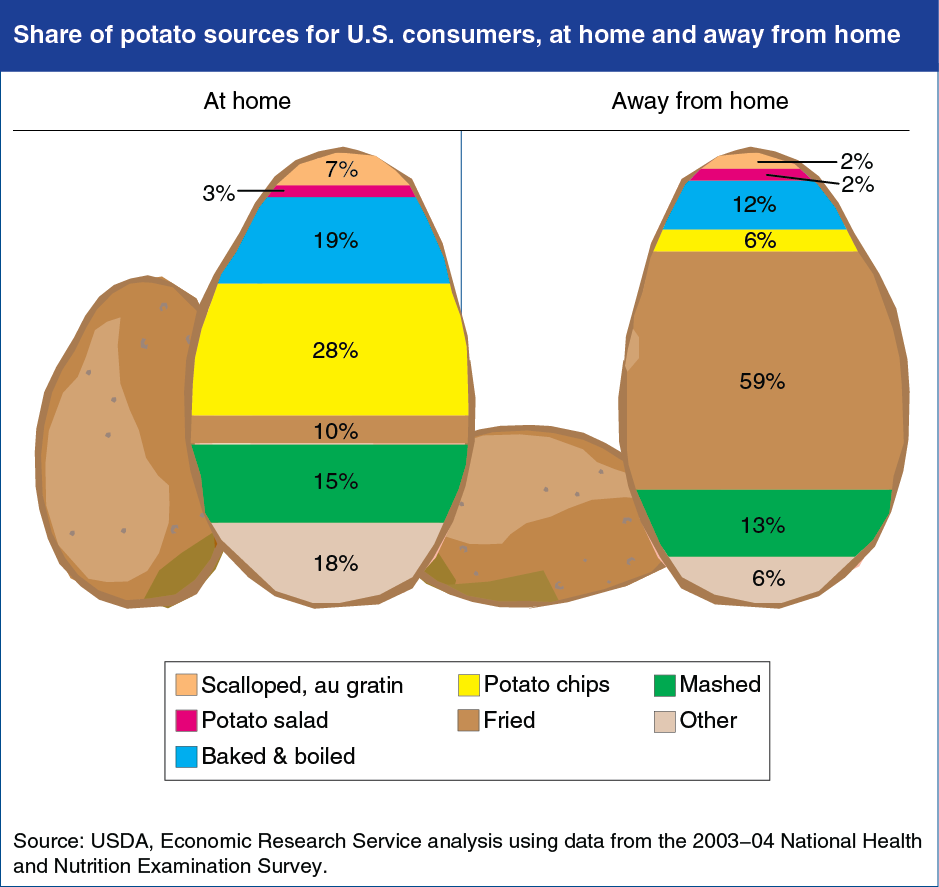Read an article about foods you shouldn’t eat and white potatoes may well be on the list. The starchy staple is linked in some studies to overweight and obesity and we lag far behind in getting enough non-starchy veggies, like leafy greens, summer squash, broccoli and colorful peppers, all shown to lower risk for several kinds of cancer. But are potatoes so nutrition-poor we should never eat them?
Potatoes’ bad nutritional reputation probably stems more from how we are eating them, rather than the spud itself.  A recent report from the USDA Economic Research Service shows that, depending on where we eat them, one-third to two-thirds of our potatoes are chips or fries. Even at home, we eat potatoes as chips more than any other way.
A recent report from the USDA Economic Research Service shows that, depending on where we eat them, one-third to two-thirds of our potatoes are chips or fries. Even at home, we eat potatoes as chips more than any other way.
Consider that a small serving of fries or chips is double the small potato’s calories, 10 times the fat and less than half the vitamin C. We just need to re-think the potato on our plate, not eliminate.
Here’s what you get when you eat a small boiled potato with the skin: about 130 calories, 3 grams cancer-fighting fiber, at least 20 percent of daily potassium and vitamin C needs, and significant amounts of niacin, folate and magnesium. That’s pretty similar to nutrients in a very large banana. And research shows potatoes contain phytochemicals such as phenolics, flavonoids and carotenoids.
At AICR, we do encourage you to eat more cancer-preventive colorful, non-starchy vegetables, but we don’t shy away from including the white potato on the New American Plate. Here’s the key – keep the skin, limit the add-ons and pair with other colorful veggies for a powerful cancer-fighting meal.
Try these healthy and delicious potato recipes:






Great information,I have prostatecancer, chemo was ineffective
Thanks for your information .
I watched a video that said , leaving on fridge cooked potatoes & eating them next day, their glycemic index would be lower? Would this help to keep potatoes as fighting cancer food? My dad has prostate cancer & he loves potatoes
Hi Paty,
Potatoes contain a wide variety of nutrients and phytochemicals like as vitamin C, potassium, flavonoids and carotenoids and potatoes can be part of a cancer protective plant forward diet. We do encourage individuals to eat colorful, non-starchy vegetables, but don’t shy away from including potatoes in the diet. A few key tips: watch portions, eat with the skin on for added fiber, and be sure to think about variety and prepare with other nutrient packed veggies and foods like beans or lentils. You can take a look this our Easy Scalloped Potato While bean Skillet recipe!